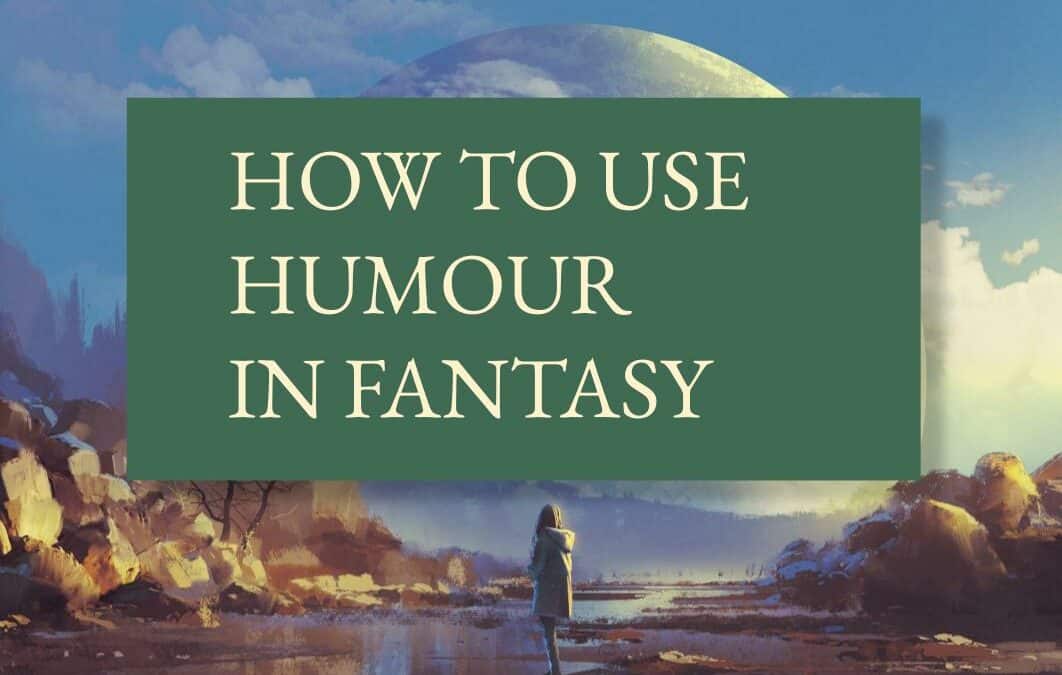Pratchett aside, fantasy isn’t a genre that immediately screams out ‘funny’. If you consider the grim-faced barbarians in Robert E. Howard’s stories, Moorcock’s tragic Elric, or indeed the epic scale of Tolkien’s work… well, it all seems a bit serious, doesn’t it?
However, I would like to remind you, dear reader, that Tolkien once went to a party dressed as polar bear (it was not a fancy-dress party) and insisted in a lecture that leprechauns were real. Moorcock makes the odd wry comment about his antihero’s odd relationship with his sword. And Howard’s stories are full of satire – and a few 20s-style jokes about women, but that’s by the by.
Fantasy is, as Pratchett points out in Hogfather, what makes us human. And a big part of the human condition is being able to laugh and joke, sometimes in terrible circumstances. With that in mind, humour is (at least in my opinion) a vital tool for any fantasy author. This article will show you how to make use of it.
Fair warning: although I’ll try not to talk too much about Pratchett in this article, I’m going to end up talking too much about Pratchett. Sorry.
1. Pratchett’s shadow (or, why you shouldn’t try to be Terry Pratchett)
Go to the nearest mirror (or failing that, a reflective body of water) and look yourself in the eyes. Now, repeat after me: ‘I am not Terry Pratchett.’ You may be a brilliant writer, with a fantastic imagination. But you are not Terry Pratchett. In terms of comedic fantasy, no-one else comes close. With that in mind, if you’re looking to incorporate humour into your work, it can be incredibly tempting to copy Pratchett.
Don’t.
Pratchett’s Discworld was meticulously sculpted. The jokes work on a lot of levels, and they require the context of the Discworld to work. For example, let’s look at Cohen the Barbarian. Now, he’s an obvious parody of Conan. Pratchett takes an idea – ‘What if Conan got old?’ – and runs with it. In The Light Fantastic and Interesting Times, this works because the other characters and the world around them is absurd as well. Cohen journeys with the Disc’s first tourist, a useless wizard, and a psychotic traveling trunk with hundreds of little legs, and all these characters complement each other. If you took the Cohen character and stuck him in Westeros, full of murder and incest, he wouldn’t be funny.
The Discworld works as a perfect ecosystem. Don’t try and poach from it.
2. Easter eggs, parody, and satire
Easter eggs are nods to the reader that don’t break the fourth wall so much as give it a gentle wrap. Stephen King does this a lot, referencing his other works. The eggs give fans that spot them a little reward for paying attention, and let’s be honest, it does make you feel clever as a writer to include them. However, if you’re going to include them, you need to be fairly sure that the reader will spot them for what they are, lest they look out of place.
Parody is another writerly tool. And it’s a powerful one. If done well, it can be extremely funny. For example, Pratchett’s wizards of Unseen University as a parody of academia. Parody doesn’t limit you to laugh-out-loud comedy, though. It can also be used for tense, dramatic storytelling. The Watch series clearly parodies detective novels, crime stories, police dramas, etc. But they are still high-stakes adventures with a protagonist you care about.
As a word of warning, parody carries a sell-by date. Discworld’s HEX works as a parody of computers because they will always be complicated machines with strange workings. In contrast, in the first draft of my novel Brigandine, I had a two-page parody of Jeremy Corbyn. Although I found it funny, it would now come across as hideously irrelevant and dated. However, I am quietly confident that my parody of Dolly Parton’s Coat of Many Colors (basically, it’s trousers made from old rags) will still be funny in five or ten years’ time.
Satire is one of those kinds of comedy that doesn’t make you laugh, but it is amusing. It holds up a mirror to our own society and makes commentary. Robert E. Howard uses Conan as a mouthpiece for his own views on ‘civilisation’ and contempt for the underhanded ways of city dwellers. Joe Abercrombie’s First Law series likewise satires political systems and abuses of power.
While it can be terribly tempting to have your character climb onto a soap box and endorse all your personal social and political beliefs, it’s best to avoid it. You’ll just end up looking like you’re lecturing the reader, and no-one wants that.
One final word of warning: don’t punch down. There’s a quote attributed to Pratchett, which is debatable in its providence, but useful nonetheless:
‘Satire is meant to ridicule power. If you are laughing at people who are hurting, it’s not satire, it’s bullying.’
3. The art of the one-liner
Snappy comebacks and quips are natural parts of human conversation. Everyone, no matter how blackhearted, has a sense of humour. From a marketing point of view, one-liners are the quotable snippets that look great as a tweet or on a bookmark. Tyrion Lannister’s line in George R.R. Martin’s A Game of Thrones springs to mind: ‘Death is so terribly final, while life is full of possibilities.’
Don’t steal from other people. Normally I’m a huge fan of taking something from history, filing the serial number off, giving it a quick re-spray, and off you go. But in this case, it will be painfully obvious if you paraphrase Wilde et al. However, if you are writing a fantasy set in this world, there’s no reason why your characters can’t quote Wilde et al. to their heart’s content.
If you’re trying to write a one-liner, don’t force it. Forced jokes are never funny and do your writing more harm than good. You can always come back to it, and there is nothing wrong with putting ‘INSERT SOMETHING FUNNY HERE’ in a first draft.
Draw inspiration from your own conversations. Basically, go down the pub with some mates and see if anyone comes up with a few zingers over the course of the evening.
Drawing upon my Jewish roots, I believe a one-liner needs one of three things: a Schmuck (one who does stupid things, like spill soup), a Schlemiel (an unlucky one, who gets soup spilled upon them), or a Mensch (a wise man, the person who ordered the salad).
Let’s take that exact situation. We’ll set it in a tavern, as it’s fantasy:
The slack-jawed serving boy stared at the duke, whose fine clothes dripped with stew. He turned to the kitchen, ‘Ma, does he still have to pay for that?’
Here the humour comes from the Schmuck’s stupidity or lack of awareness. Let’s try the Schlemiel:
The duke leaned in close to the Archmage, his doublet reeking of too much perfume.
‘I’m a powerful man. And I always get what I want.’ Pursing his lips, he lunged for a kiss, only to find himself covered head to foot in steaming broth. The Archmage leaned back and brushed a pea from her sleeve.
‘Did you want that?’ she said with a grin.
Sometimes, the Schlemiel is just pathos. It’s one damn thing after another befalling this person, and we might feel sorry for the guy. In some cases, like the example below, it’s comeuppance and a sense of justice.
Finally, let’s look at the Mensch:
The Archmage and her apprentice rode hard into the night, leaving the tavern far behind them.
‘But how did you—?’
‘All in good time lad, all in good time. All magic has its place. Sometimes, the best spell is Fireball. Another time, it might be Scrying. And sometimes, just sometimes, it’s a Butterfingers Cantrip cast on a poor serving boy.’
Here, the comedy isn’t laugh-out-loud. But the comedy comes from the Mensch’s wisdom and insight, a pithy observation about the world or human nature.
4. Incompetent does not equal funny
Going back to Pratchett, you might be first forgiven for thinking his heroes are all useless. After all, Rincewind is a Wizard who can’t cast spells. Nobby Nobbs and his partner, Fred Colon, are pretty rubbish policemen. But here’s the thing – those characters are not just funny because they’re competence-impaired, but because of the situations they are thrown into.
It’s also worth saying that a lot of Pratchett’s characters are incredibly powerful. Granny Weatherwax is greatest Witch on the Disc, and Death himself (with a capital D) gets involved in the stories. With such characters, the comedy comes from the personality quirks of the characters, like Granny Weatherwax being a blood-minded, interfering old crone, or Death’s little quirks of humanity.
That being said, who can forget Death falling off his horse at the start of Mort (‘BUGGER.’)? And Granny’s slightly shaky grasp of written English? Both of these are weaknesses in powerful characters and occasional slip-ups that not only add humour, but also stop an all-powerful character from looking too invincible.
5. Comedy can still be tragic
He was still pale. There was a half-eaten plate of something on a table and the bandages were fresh, but I could still smell the tang of iron in the room from a pile of bloody dressings.
‘How are you?’
Quentin opened his eyes and looked up at me. His face had changed so much. Not just the aging from the magic at Scandar, but from what we had seen and done together. Decroix had made the hard decisions and tidied up the messes, but his brother had felt it every much as him.
‘I’ll be honest, Ulf. Pretty shit.’
I smiled weakly and tried to force my face to stay still.
‘Duke Colsarne was right. I should have gone for the war sword. To be fair, at least now I don’t have to worry about what type of sword to use ever again.’
‘Is there anything I can do for you? Anything I can get you?’
‘There is actually. I need a book. Can you find it for me?’
‘What is it—?’
‘It’s called How to Be a Wrestler with No Hands.’
He tried to smile but tears started to flow from his eyes and I shuffled backwards.
‘Or, if you can’t find that one, have a look for How to Hold a Woman’s Tits with No Hands. Or How to Ride a Horse with No Hands. Or—’
He broke down in tears. Huge sobs of pain and anger. He brought up his stumps to his face before throwing them back down onto the bed with a howl of grief.
I opened and closed my mouth once before I rushed out of the room.
Okay, indulge me a little bit here – this passage is from my own book, Brigandine. Dark comedy and schadenfreude take the idea of the Schlemiel to the extreme: something so horrible, you can’t help but laugh. Because if you don’t, you’ll cry.
In the end…
So, don’t be afraid of comedy. Even Shakespeare had the odd clown.
Remember, anyone can write an epic battle scene, but it takes a real writer to make someone laugh. As Edmund Gwenn supposedly said on his deathbed, ‘Dying is easy, comedy is hard.’
Jack Shannon is a massive nerd. He’s also the author of Brigandine, a Grimdark fantasy novel full of swords, bloodshed, and Lovecraftian horrors. If you like your books sweary, bloody, and just a bit funny, why not give it a read?
Do you write fantasy or science fiction?
Join our email list for regular writing tips, resources, and promotions.

